Lottie Thompson
Five years ago, the writer was honoured to share with our readers the story of Murray Thompson, his memories and his highlights. Murray died in March of 2015. Today, his partner and wife Lottie shares her story. The writer felt honoured to sit in Murray’s favourite chair, the one he used when he would relay his memories of war and life on Manitoulin. Lottie is a bit ‘under the weather’ today, getting over a cold, but she was glad to meet with me.
Family life with numerous get-togethers have dotted Lottie’s life on Manitoulin, as she moved from Kagawong in her early years to Little Current, Sandfield, Sault Ste. Marie and back to Manitoulin where she became Mrs. Thompson. Lottie has visited all parts of Canada and loved all her trips.
Lottie was the third child born to Guy and Janet (nee McDermid) Palmer on March 19, 1927 on a back street in Kagawong. “Our neighbour Lottie McKenzie helped my mother with the birth and I was named after her.”
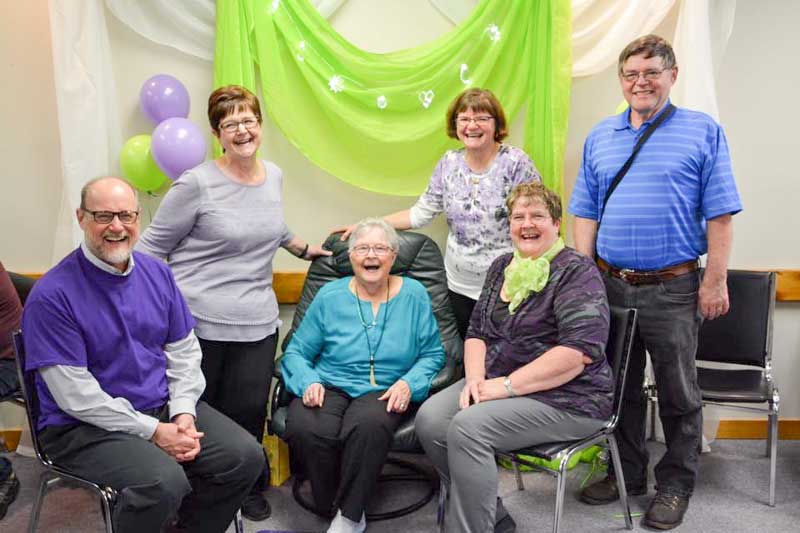
Paternal grandfather Robert Palmer, born in 1852, and his wife Laura (Wright), 10 years his junior, emigrated from England. They married in 1877 and lived in the Ice Lake area. “I remember looking for eggs in the barn for grandmother. I was a bit nervous reaching under the hen for her treasures. If she was brooding, she would peck at my hand. Mostly we managed to get the eggs without injury.” In her later years, paternal Grandmother Palmer was hard of hearing and you had to shout in her ear. She always liked Canada, her adopted country, and she became a great quilter, winning prizes all over the Island.
Duncan and Mary (Clinton-Simco) McDermid, maternal grandparents of Scottish ancestry, were married in 1880 in Providence Bay and made their home in Mindemoya, near the old hospital. They had eight children. Duncan died at a young age from a heart attack. “Murray McDermid, son of Jim McDermid, was my cousin. His dad and my mother were brother and sister,” Lottie continues. “I remember visiting Grandmother McDermid often. She would see us coming up the path and be waiting at the door. We were always greeted with a ‘Well, well, well’ and a big smile. It was very exciting to arrive at her door. You just knew you were welcome. The table was usually set for tea. She had a unique stove with two doors. You could put wood in from either side.”
“I remember my older sister pulling me in a cardboard box, with great velocity, through all the doorways in our house. Mother was afraid that I would get dumped, but I never did, despite the great speed and the lack of wheels. I liked playing with my three older sisters. My little sister, Shirley Ann, was a little spoiled but I got along well with the older sisters, especially when it was one on one. Two or more of us usually led to a squabble. I was a bit of a hoarder too because I had a hard time parting with any of my possessions. I collected cut-out dolls and putting on their clothes kept me busy for hours.”
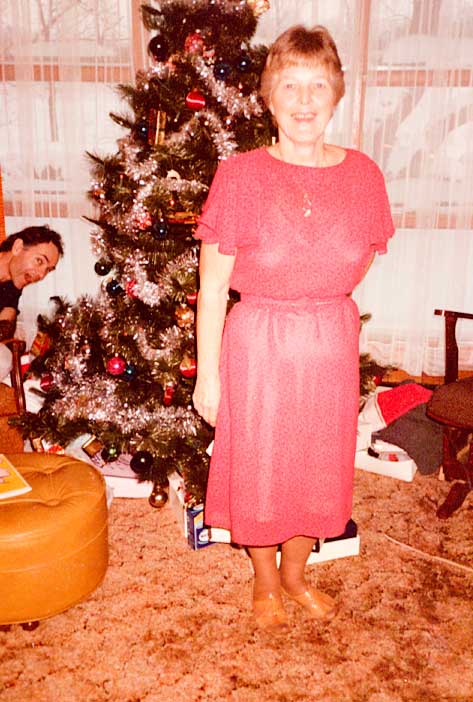
“Mother was very strict. You couldn’t argue with her. She would cut you off with a firm ‘That’s enough!’ whereas dad was more easygoing. He would consent to tow us on skis, behind the Model T, his first car. He had made the skis. He wouldn’t go fast because the bare patches of gravel were hard on the wooden skis. Being a good carpenter, he knew how to steam the ends of the boards, put them in braces and let them dry. They would come out of the brace perfectly well-curved.”
“My uncle lived below the big hill in Kagawong. He would turn his car around and back up the hill so that if the car stalled, he could just drive back down the hill. It was less stressful that way. One time my dad was going up the Jerusalem Hill in low gear, with mum in the front and my little sister and me in the back. The car stalled half way up the hill and he couldn’t get the transmission back into gear, while the car was picking up speed. He opted to run into the rock cut. Neither the car nor its occupants were hurt in the process.”
The family recalls a tragic drowning of two young men in Lake Huron in 1933. “The Youngs lost James, 23, son of the senior James. The Purvis family lost William, 21, son of Edward. The boys had been out picking up nets when the water got rough and the motor on their punt likely shut down. The boys were found the next day, by their fathers, on the shore, some distance from where the boat washed up. The Recorder reported the deaths.”
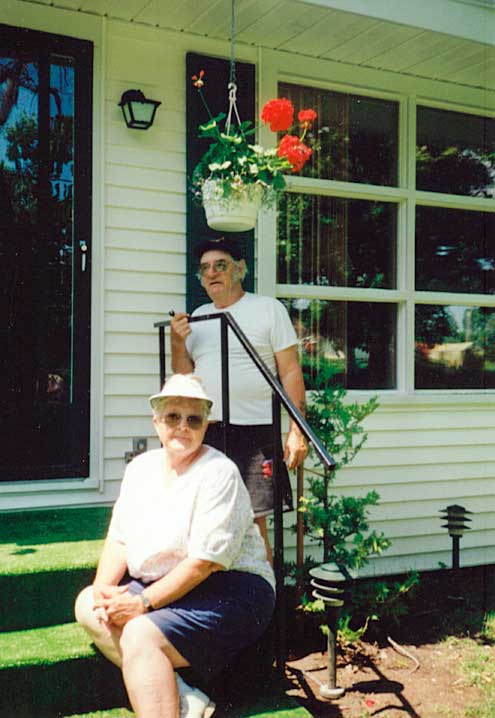
“School for me was in several places. My dad built six bass ponds in Sandfield, so the hatched fish could travel in at one end and out the other. We lived there for a while. Sister Anita did the bookwork for dad and I went to school. I went to the Little Current school too, while dad built some houses there with his crew. For high school, I was in the Sault where dad was renovating and re-roofing the United Church. High school was more fun because we had different classes to go to and different teachers. After high school, we moved back to the Island to our own home.”
Murray and Lottie met at a get-together at his home after the war ended. Murray’s mother had thrown a welcome home party for her son, who had been in the air force. “I had known of Murray before he left for Europe. I knew he was an only child, drove a little too fast and was quick to tease. When he returned to the Island after the war ended, he was more mellow and easier to get along with. We saw each other at the party and that was it for both of us.”
“Dates included a few dances, but dancing was not Murray’s favourite pastime so we found other entertainment. We saw ‘Gone with the Wind’ twice on wooden benches in the hall in Kagawong. If we took the Jaqueline to the other side in Little Current (before the swing bridge allowed cars, not just trains, to cross), to catch a show, shop or eat in a restaurant in Sudbury, we had to make sure to get back to the ferry by 11 pm or we had to spend the night in the car. There were no runs after 11 pm. We always made it, even though it seemed to take longer coming back.”
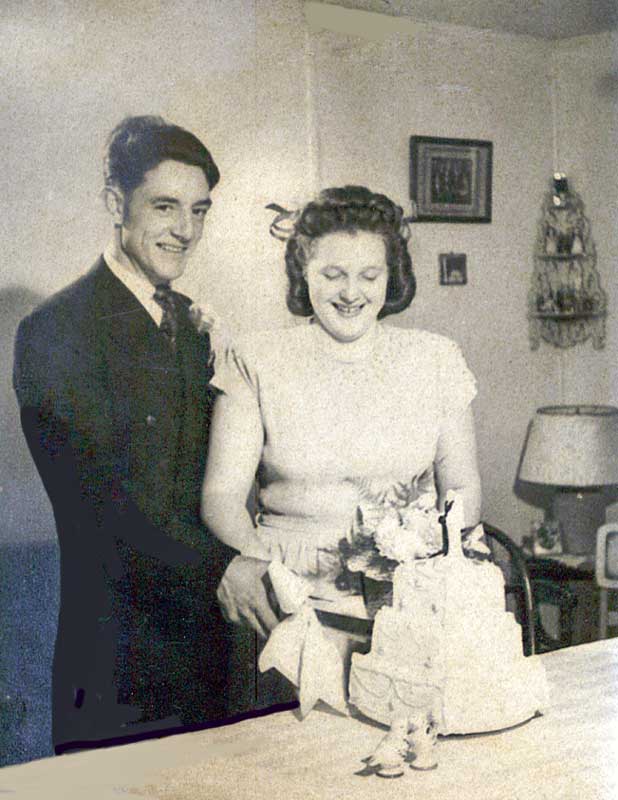
The couple was married on December 4, 1946. Murray chose this date so they could claim their married state for that tax year. It was a cold day and the only date left before the new year at St. Paul’s United Church in Kagawong. A reception was held at the Orange Hall. “Our guests were happy with the lunch and the dance afterwards. I threw my little bouquet but I don’t remember now who caught it.”
“For our honeymoon, we went to the Sault, crossing the bridge to the American side and bought our furniture for the house. We were able to buy it all at 10 percent of the cost as the veteran’s association had indicated. It was fun to buy all our household items for the dining room, the front room and the kitchen. We took it all home in the truck.”
They moved into the home they had purchased for a $1,000. It was up on the hill over Kagawong. Murray’s parents lived on a nearby farm on the 10th Concession Line. “My mother lived on the road to Gore Bay, beside Berry Boats, so both were nearby.” Lottie helped out on the farm of her in-laws. She drove the tractor and helped to bring in the hay using the horse and the flatbed. She even helped dig out the foundation for their own house with a backhoe. Lottie also mixed cement so Murray could pour it into forms. One minute he would yell, ‘faster, faster’ and the next complain, ‘you are pulling my arms out by the roots!” Colourful language often accompanied these working bees.
Murray started on the inside work after he finished the roof. He could do plumbing, wiring and many other jobs. “I did the painting.” The couple was given two cottages by Murray’s parents as an investment. We could rent them out and bring in extra money. One of them is a house now, the other is still a cottage. “My mother-in-law insisted that the floors be scrubbed regularly and painted yearly. This was no problem while my knees were supple enough, but later, that task became more difficult.”
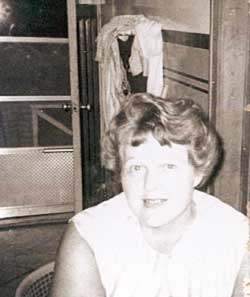
Six children were born to the family: Morris, Terry Lee, Alexis Ann, Kimyly, Rodney and Lynn. “I taught Morris how to ride a bike and he taught Lynn and Rodney. Today Morris is a retired regional police office in Sudbury. Terry Lee went west to Vancouver. She wound up near Alaska where her husband was working in a mine and she did office work. Alexis Ann did secretarial work in Chelmsford. Kimyly did Home Care in Hanmer before she retired to Gore Bay. Rodney was employed with the Dept. of Education, in Human Resources, in Toronto. He retired and came home. Lynn works for the MNR overseeing the office work in North Bay. She is slated to retire later this year.”
“The fondest memories for me revolve around our wedding, having the family, and watching them grow to be fine individuals. I was in the hospital about to give birth to our fourth child when I got a call from Murray saying that our house was on fire. I thought he was joking at first but soon realized he was serious. He hadn’t even brought my clothes to the hospital yet. That was slated for the next morning.”
“Absolutely everything went up in smoke, all the furniture, clothing, personal items that can’t be replaced and the house itself. Lightning had hit our house while Murray was working at the hydro plant, not far away. Murray’s parents had come to pick up the kids and buy hot dogs for Terry’s birthday celebration later that day. When they returned, the house was already ablaze and it was too late to save our home. My mum could see the lightening hit a target and then saw smoke and she wondered if it was our home, but she was far enough away that she couldn’t get there in a hurry.”
“Terry was sad about her birthday and teary about the new dress she had lost in the fire. She sat in the car and just cried. It seems Perry Anglin’s parents, who lived in Mindemoya, stopped to see if they could help. ‘My birthday dress is in there,’ Terry professed through tears. The Anglins immediately drove to Gore Bay to purchase a new birthday dress for Terry. She was ecstatic and the day was partially saved! Baby Kimyly was born the next day. The new home was rebuilt on the same footprint, but it was made larger for the growing family.
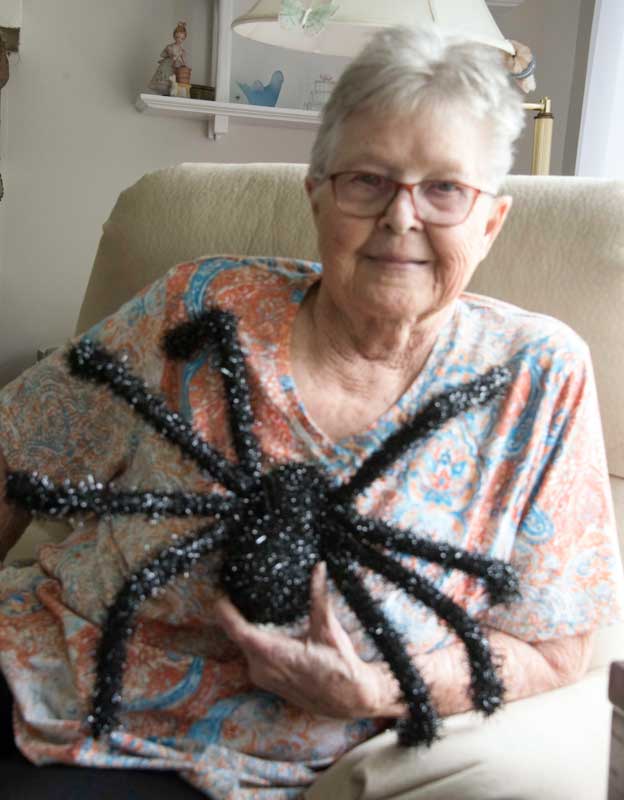
party.
Lottie recalls the day she had an allergic response to penicillin. “I broke out in a rash all over and was waiting to get a ride to the hospital. Murray took a photo of me with the kids watching anxiously, but it is hard to see the rash in the photo. Everything cleared up again in a couple of days.”
Card-playing was not encouraged by the mother of the house. “I recall my brothers playing cards until they fought with each other. Grandmother had warned them to stop squabbling but they would not. Finally, she came over, gathered up the cards and tossed them in the stove. I have always discouraged our family from playing this contentious game.” However, a few poker games were enjoyed at the neighbours on a Saturday night.
Lottie was part of the UCW, the United Church Women’s group. “Mostly we raised money with dinners, money that could be used for worthwhile projects in the community.” She was also part of Stitch and Bitch, another women’s group that encouraged the ladies to share their concerns while also working on a textile project. “We did all our grumping at these sessions. They were great.”
“My favourite time of the year is the fall. I love the coloured leaves and the crisp cool weather. Evenings are harder for me. Twilight signals the end of the day, the end of the day’s life. My mother used to sit in the twilight on the porch and extend her vigil until the dark sometimes. One time she was babysitting my sister’s young lad. He professed, ‘Gramma, I am not afraid of ghosts.’ In no time at all, he had reappeared and asked, ‘Can I sit on your knee?’ Gramma had smiled and had gathered him up to the safety of her lap.”

Travelling had been a mainstay for the couple in earlier years. “We have visited all parts of Canada, east to west, our favourites being PEI and Newfoundland. We did some boating there, admired the bridge and we really liked the people in PEI. They were so friendly, kind of like our Island. I recall a man at the dock in Newfoundland told us a joke. ‘A man was crossing on the boat and it caught on fire. We were told to get our life jackets on. We said, ‘we would rather cook than freeze to death in the icy water, so no life jackets were donned and yet, the group survived the trip’.” This surely was a testament to the pragmatic, dry humour of the East Coast.
“Murray and I used to curl for fun. We won several trophies for the sport. One of these was won by four of us, Marge and Norm Pierce, Murray and I, at a bonspiel in Gore Bay. When we were younger, we ski-dooed across the lake. One time we travelled on two machines. Murray was on one with our niece Pat and I was alone on the other machine. Murray was going off at a great speed but I followed behind, at a slower rate. Suddenly Murray’s machine went through the ice. Both he and Pat managed to get off the machine and stay on top of the ice. It ended well and we rescued the snowmobile the next day.”
“We have 10 grandchildren now, six here and four in Australia. Great-grandchildren number 16. My recipe for happiness is ‘don’t interfere with other people’s problems.’ It seems to work because problems have to be sorted out by the person themselves, if they are really going to be solved.”
“You ask if there is anything I still want to learn or go back and change if I could. There really isn’t anything I can think of right now. I am not afraid of anything, except bears maybe. I do not fear losing my independence. My mother said she would go to a nursing home when she reached a stage where she cold no longer take care of her own needs and she did just that when the time was right. I will do the same. I am 90-years-old and really, if something is beyond my control, why worry about it? That isn’t very useful.”
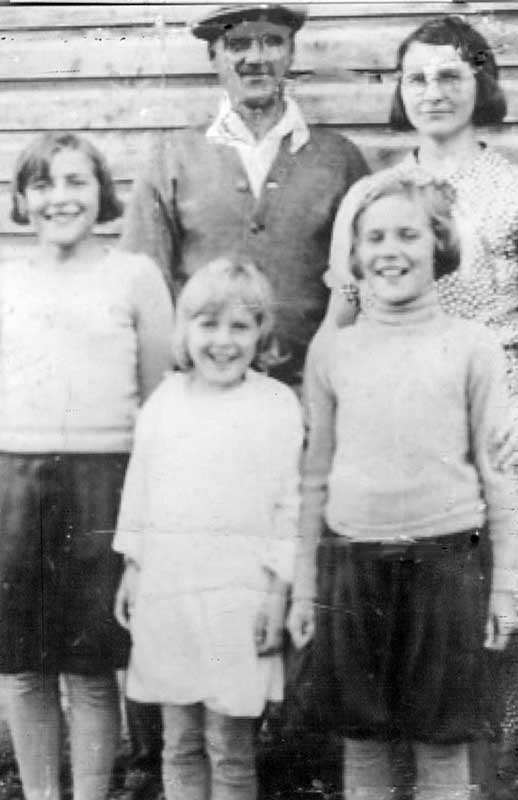
“We have a tradition of regular family parties, notably for Easter and Thanksgiving. Christmas with the unpredictable weather is more challenging for get-togethers. Every August first weekend, we have a reunion based on a theme previously agreed to. Lynn seems to be the ‘quarterback’ for these parties. She likes to get things going. This year, I will be Miss Muffet and I will carry this big spider for our theme of ‘nursery rhymes’.” Lottie shows me her prize arthropod and the writer takes her photo. “We have held Mexican parties, ‘Around the World’ and Star Wars (Murray was Darth Vader).”
“I love the family get-togethers at Christmas and especially at Easter and Thanksgiving. Most of the family comes for these two celebrations as well as our August theme party, which is always a hit. This year we also celebrated my 90th birthday. It was extra special to have them all here for that day. It would have been even more special if Murray could have joined us.”
“My strengths are my ‘easy-going’ nature. Others are not sure how I stay so calm during the storms we all encounter. I generally don’t get too uptight about events. That is my way. I love to knit and crochet,” Lottie concludes. “The people here make this place special. I admired my teacher Elizabeth Rogers who taught all the grades in her one-room schoolhouse, and one of the children’s teachers, Mamie Gordon, Stan’s mother. I have always had friends here and you can depend on people to help you when you need it most. If you have trouble they will come and ask, ‘what can I do?’ and they mean it. At one time, I wanted to go back to the Sault. I always felt safe there too, even walking at night. You could walk anywhere here on Manitoulin too and not much happened. Generally, now, parents seem to be more protective of their children, but this place is still special to me. Both our parents lived near here. My family is still here and although I am getting older now, I can still reside happily here in my own home that I built and shared with Murray.”
Life is pretty-good for this nonagenarian.



